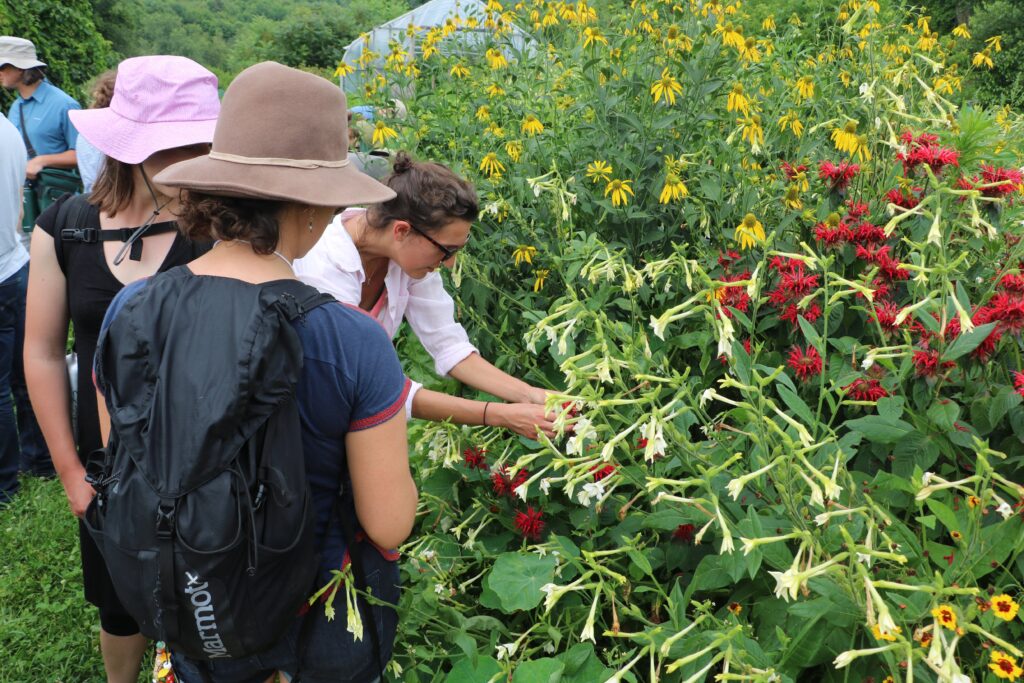Agroecology and Teaching at UVM
We have a diverse range of pedagogical programs at UVM, including working with undergraduate students, graduate students and community-members both inside and outside of a formal classroom setting. In our Advanced Agroecology course (PSS212), for example, we work with undergraduate students and strive to transcend the limitations of traditional university courses. This journal article, led by Katie Horner, critically analyses this course, and highlights the impact and potential of transformative agroecology education in the U.S. It demonstrates how the teaching team has focused specifically on deconstructing the student-professor hierarchy and integrating multiple types of knowledge in course content and assignments. Long-term partnerships with local farms are a key component of the course and enable students to contextualize in-class learning via on-farm experience and relationships with farmers and peers.
To complement undergraduate education in agroecology, the Institute coordinates two undergraduate research fellowship programs, our Undergraduate Research Fellows and the AX Fellowship. The Undergraduate Research Fellows program engages students in a year-long inquiry into agroecology through their participation in a participatory action research project, while serving as peer leaders in the Advanced Agroecology course mentioned above. A formative approach to this program’s early development resulted in this article, led by Karen Nordstrom. The AX Fellowship is a 10-week summer exploration of university extension research and outreach projects through the lens of agroecology. AX program leadership involves Institute colleagues Karen Nordstrom, Scott Lewins, and Vic Izzo
In addition to undergraduate course offerings, the Intitute offers a low-residency, 15-credit Certificate of Graduate Study in Agroecology (CGSA) which includes five courses that can be taken as stand-alone courses. This coursework leads participants through an examination of potential pathways towards the transformation of food systems by integrating economic, social, and ecological perspectives. A micro-certificate (9 credits) and à la carte options are also available.
Pedagogy in movements for agroecology and food sovereignty
Social movements, peasant organizations and radical educators have been deeply engaged in education for food system transformation, which opens the door to social transformation. Our scholarly work includes examining how processes of education and learning are being deployed in movements for agroecology and food sovereignty, largely outside of the sphere of formal education.
This work focuses on learning as a social movement strategy, and is based on participatory action research (PAR) and on close collaboration and solidarity with our partners and grassroots educations in organizations and communities.
In this sub-area of our work, Nils McCune has long-standing work on learning processes with social movements in Latin America and North America. For example, in his co-authored article on “teaching the territory”, Nils examines peasant-to-peasant learning in Mesoamerica and the Caribbean, calling for educational theory and practice to move beyond the focus on the individual towards a focus on the concept of the territory as a collective learning process.
In addition, Colin Anderson has carried out action research with partners in social movements and transformative learning in Europe, in which they propose four pillars of transformative agroecological learning, published in a special issue on learning in food movements
People from IFA
Katie Horner, Karen Nordstrom, Martha Caswell, Nils McCune, Vic Izzo, Ernesto Mendez, Colin Anderson, Scott Lewins

 Processes of learning are a critical piece to advancing broad transformation for justice and sustainability.
Processes of learning are a critical piece to advancing broad transformation for justice and sustainability.